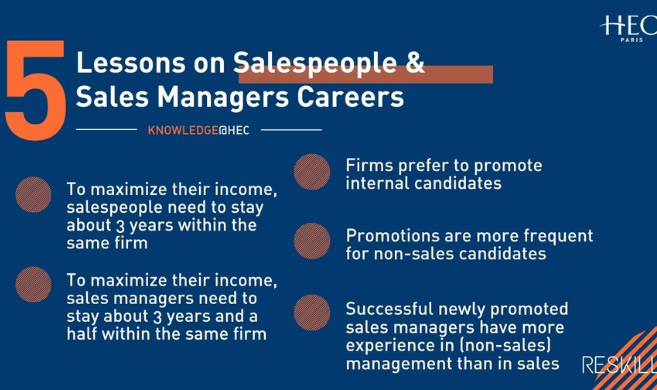Watch the replay of the RESKILL masterclass:
1. Promotion is more likely if you come from outside the department
The promotion to sales management is more frequent for people with non-sales managerial experience. In other words, we're talking about lateral transfers. So, when firms want to promote their employees to sales management positions, they do it from other functions, not from the sales function, or at least not as frequently. As a consequence of this reality, salespeople need to manage their managers because they probably know more about sales than their bosses! This is something which needs to be taken into account, especially in terms of training sales leaders.
2. Firms prefer to promote internally
These results can also be explained by the fact that firms have internal pipelines. They are sourcing their sales managers mostly within their own management team in other functions. Statistically three out of four sales managers come from the same companies. And two out of three are recruited from other managerial functions. Why is this? Well, probably because there's less risk. When company leaders choose their sales managers from other functions, they know them already. It's easier to assess their competencies and their performance as managers. It's easier to develop their talent because they are internal members. Whereas if they had to choose external candidates, they will always be a risk factor of selecting the wrong person.
3. When a salesperson or a sales manager reaches a compensation plateau
Our research confirms the relationship between experience and compensation has an inverted U-shaped function. The research suggests there is a number of years that a salesperson stays within a firm, within a sector or within the occupation that corresponds to a maximum income level. Indeed, salespeople who stay 2.9 years within the same firm, reach the highest level of income. In other words, if they leave before or after, they're probably going to earn less. For sales managers, it's a little bit longer, an average of 3.4 years within the same firm before the plateau is reached. Now if we're talking about industry experience, it's about the same thing (i.e., 3.1 and 3.6 years for salespeople and sales managers respectively). The plateau is reached in 3.4 years for sales occupation experience. The compensation of sales managers plateaus at 6.4 years. Note that mobility amongst salespeople mainly occurs within a given industry. Salespeople rarely change industries.
4. Successful newly promoted sales managers have more experience in (non-sales) management than in sales
We found counter-intuitive lessons on successful sales managers. If we define success in terms of compensation level and in terms of speed of upward mobility, then we note that sales managers are more successful if they have less experience in sales, firms and industries! This appears compensated by a greater experience in management outside the sales sector. However, they are more likely to quit the same year as their promotion to sales management.
5. Companies need to adapt their training programs for managers
So, what does this mean for firms? Well, in this time of the Great Resignation these results imply that company leaders must understand that when they promote sales managers coming from other functions, they need to pair this promotion with other types of training to make sure that these managers are comfortable with the job so they remain in the firm. Indeed, we saw in the data that the year managers are promoted, these profiles (managers from other functions) tend to quit much more than the other types of profiles (managers with sales experience). However, two years after their promotion to sales management, these profiles (managers from other functions) are less likely to leave.
Key insights
Our research is based on a French data set and there may be differences depending on the country (e.g., legal environment, cost of living). But the phenomena of technological evolution, achievement weariness or accrued sales skills with experience exist everywhere in the Western world.
Let’s note that there may be factors changing the structure of the compensation plan, which is not a question we addressed. A few years ago, I worked with colleagues on the issue of variable compensation and how it varies across countries, industries, and firms. We compared compensation structures across six European countries and discovered that compensation structures are linked to tax policies. This is an interesting finding because, when designing compensation plans, sales leaders are trying to maintain equity by creating a compensation gap between the lowest and highest performers. If you are a high performer, you don't want to be paid the same as a low performer. But when tax pressure increases, the compensation gap (between high and low performers) does mechanically decrease. So, what we discovered in this study is that companies seem to be fighting tax pressure by increasing variable compensation in order to maintain equity and motivation within their sales teams. So, in countries where tax pressure is higher, variable compensation rates are also higher.










